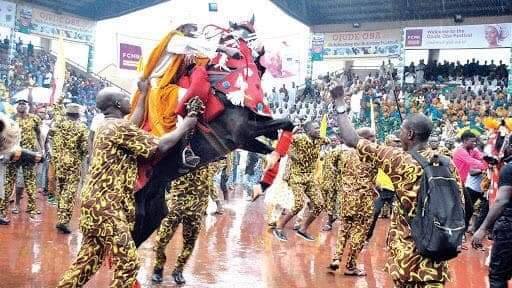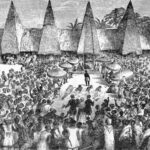History and Background
The Ojude Oba Festival, which translates to “The King’s Court Festival” in English, has a rich history spanning over two centuries. It originated during the reign of Oba Adesimbo Tunwase, the 47th Awujale of Ijebu-Ode, who ruled from 1886 to 1895 1. This annual festival takes place on the third day after Eid al-Kabir (Ileya), coinciding with the Muslim festival of sacrifice.
Evolution and Cultural Role
The festival serves as both an homage to the reigning monarch and a celebration of cultural heritage. Over time, it has evolved into a major cultural event that draws people from all corners of Nigeria and beyond. Here are some key aspects:
- Parade of Age Grades (Regberegbe): Young men representing various age grades dress in colorful costumes and perform traditional dances. These age grades symbolize unity and continuity within the Ijebu community.
- Influential Families and Horses: Members of influential families ride adorned horses during parades. The horses, bedecked in vibrant materials and beads, play a central role in the festivities.
- Mock War Performances: Baloguns (family heads) reenact war scenes, showcasing the valor and history of the Ijebu people. Horses perform stunts, including rhythmic trotting and standing on hind legs, while Dane guns add to the electrifying atmosphere.
- Economic Display: Families vie to wear the most exquisite traditional attire, emphasizing their economic status. Coordinated colors, patterns, and styles make each family stand out.
2. Symbolic Meaning and Importance
Unity and Tourism
The Ojude Oba Festival symbolizes unity among the Ijebu people. It transcends religious and social boundaries, bringing together Muslims and non-Muslims alike. The festival’s inclusivity fosters community cohesion and strengthens cultural bonds.
Moreover, the event attracts tourists, scholars, and enthusiasts from far and wide. It showcases the rich tapestry of Yoruba culture, drawing attention to Ijebuland’s historical significance.
Rallying Point for Tradition and Monarchy
As a rallying point, the festival unites the community in celebrating their cherished traditions. It reaffirms loyalty to the Awujale, who embodies the continuity of Ijebu heritage. Through vibrant displays, music, and dance, the Ojude Oba Festival honors the monarch’s legacy.
3. Impact on Ijebuland’s Development
Economic and Cultural Boost
The festival contributes significantly to the local economy. It stimulates commerce, as artisans, traders, and vendors converge to sell their wares. Additionally, the influx of visitors boosts hospitality, transportation, and other related services.
Culturally, the Ojude Oba Festival preserves and promotes indigenous practices. It ensures that future generations inherit a vibrant cultural legacy, fostering pride and identity.
In conclusion, the Ojude Oba Festival transcends mere spectacle; it embodies the soul of Ijebu culture, connecting the past, present, and future. As the horses prance and the regberegbe dance, the spirit of unity and tradition thrives, echoing through the colorful streets of Ijebu-Ode.


